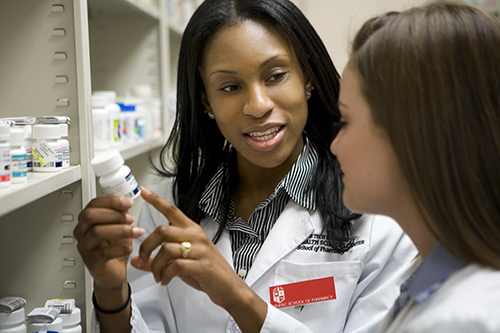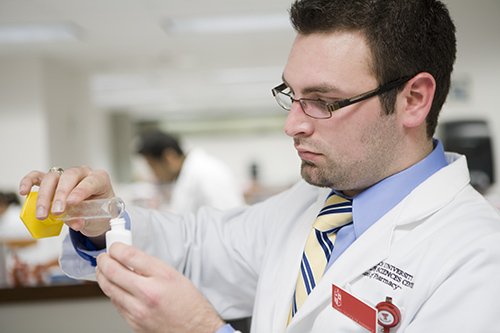7 Careers to Pursue with a Pharm.D.
The professional degree prepares practitioners for a wide variety of pharmacy career options.
The Texas Tech University Health Sciences Center (TTUHSC) School of Pharmacy offers the Doctor of Pharmacy (Pharm.D.) as its single professional degree. The program prepares entry-level pharmacy practitioners
to become a licensed pharmacist and pursue one of many career options in the field.
Here are just a few to consider:
 Community pharmacists are the most accessible health care professionals since appointments are not required
and many pharmacies are open late in the evenings and, perhaps, 24-hours per day.
Community pharmacists are involved in preparing and dispensing medications, providing
patient counseling and education, assisting patients in selecting non-prescription
therapies, and administering vaccinations. Community practice also allows for involvement
in business operations, either through ownership or by becoming part of management
teams within chain pharmacies.
Community pharmacists are the most accessible health care professionals since appointments are not required
and many pharmacies are open late in the evenings and, perhaps, 24-hours per day.
Community pharmacists are involved in preparing and dispensing medications, providing
patient counseling and education, assisting patients in selecting non-prescription
therapies, and administering vaccinations. Community practice also allows for involvement
in business operations, either through ownership or by becoming part of management
teams within chain pharmacies.
Compounding pharmacists create customized medication formulations and dosages that are not commonly or readily available. Although some compounding is often part of community practice, certain pharmacists specialize in compounding and practice in facilities dedicated to this service.
Ambulatory care pharmacists are involved in providing advanced patient-care services in the community. While many community pharmacists offer aspects of these services as part of their practice, ambulatory care pharmacists focus on this component to help patients manage their ongoing/chronic illnesses. Patient-care or clinical services include comprehensive medication reviews to ensure patients are receiving optimal cost effective therapies, and communicating with prescribers to assure continuity of care. Ambulatory care practice includes patient education, health screenings, and wellness promotion programs.
Hospital pharmacists can be involved in a multitude of services. Pharmacists participate in the medication distribution process, ensuring that medications get to the appropriate patients. They also prepare medications such as intravenous preparations. Pharmacists ensure medications are properly prescribed to offer optimal benefits for the patient and provide clinical services by rounding with medical teams and making recommendations related to selecting and monitoring optimal medication therapies, preventing medication errors and adverse drug events, and educating patients about their medications. Many pharmacists elect to focus on specific patient populations and specialize in areas such as cardiology, pediatrics, emergency medicine, and other specialties.
An academic pharmacy career allows pharmacists to educate future professionals and impact the future of the profession. Academicians are involved in teaching, research, and service to the profession. Many pharmacists in academia continue to provide patient care and/or pharmacy services in a variety of settings based on their specialty and training but have the added opportunity to offer educational instruction to student pharmacists both in-class and in real life practice settings.
 Pharmacists also work for governmental agencies such as the Food and Drug Administration to ensure
that only safe and effective medications are available to the public. Pharmacists
also serve in the Public Health Service, providing patient services to Indian reservations
and other underserved areas.
Pharmacists also work for governmental agencies such as the Food and Drug Administration to ensure
that only safe and effective medications are available to the public. Pharmacists
also serve in the Public Health Service, providing patient services to Indian reservations
and other underserved areas.
Pharmaceutical industry careers offer a broad range of opportunities for pharmacists. Pharmacists can be involved in areas such as research and development, sales and marketing, medical communications, drug regulatory affairs, and medication safety. These pharmacists combine their extensive knowledge of medications with their abilities to make new medications available to patients and communicate new information to consumers and health care professionals.
MORE ABOUT THE PHARM.D.
The Pharm.D. is a four-year professional program, requiring at least two years of pre-professional studies that may be completed at any accredited college or university. Students are admitted once each year for enrollment in the fall semester. Studies must be on a full time basis. Students will spend the majority of each weekday in classes, laboratories, or clinical experiences.
MORE ABOUT THE SCHOOL OF PHARMACY
The TTUHSC School of Pharmacy is unique in that it’s the only TTUHSC school not headquartered on the main campus in Lubbock. Located in Amarillo, we educate pharmacy professionals here and at regional campuses in Abilene, Dallas/Fort Worth and Lubbock.
Related Stories
Celebrating Veterans: TTUHSC’s General Martin Clay’s Legacy of Service and Leadership
From his initial enlistment in the Army National Guard 36 years ago to his leadership in military and civilian health care management roles, Major General Martin Clay’s career has been shaped by adaptability, mission focus and service to others.
Texas Tech University Health Sciences Center School of Nursing Named Best Accelerated Bachelor of Science in Nursing Program in Texas
The TTUHSC School of Nursing Accelerated Bachelor of Science in Nursing (BSN) program has been ranked the No. 1 accelerated nursing program in Texas by RegisteredNursing.org.
TTUHSC Names New Regional Dean for the School of Nursing
Louise Rice, DNP, RN, has been named regional dean of the TTUHSC School of Nursing on the Amarillo campus.
Recent Stories
The John Wayne Cancer Foundation Surgical Oncology Fellowship Program at Texas Tech University Health Sciences Center Announced
TTUHSC is collaborating with the John Wayne Cancer Foundation and has established the Big Cure Endowment, which supports the university’s efforts to reduce cancer incidence and increase survivability of people in rural and underserved areas.
TTUHSC Receives $1 Million Gift from Amarillo National Bank to Expand and Enhance Pediatric Care in the Panhandle
TTUHSC School of Medicine leaders accepted a $1 million philanthropic gift from Amarillo National Bank on Tuesday (Feb. 10), marking a transformational investment in pediatric care for the Texas Panhandle.
Texas Tech University Health Sciences Center Permian Basin Announces Pediatric Residency Program Gift
TTUHSC Permian Basin, along with the Permian Strategic Partnership and the Scharbauer Foundation, Feb. 5 announced a gift that will fund a new pediatric residency.
